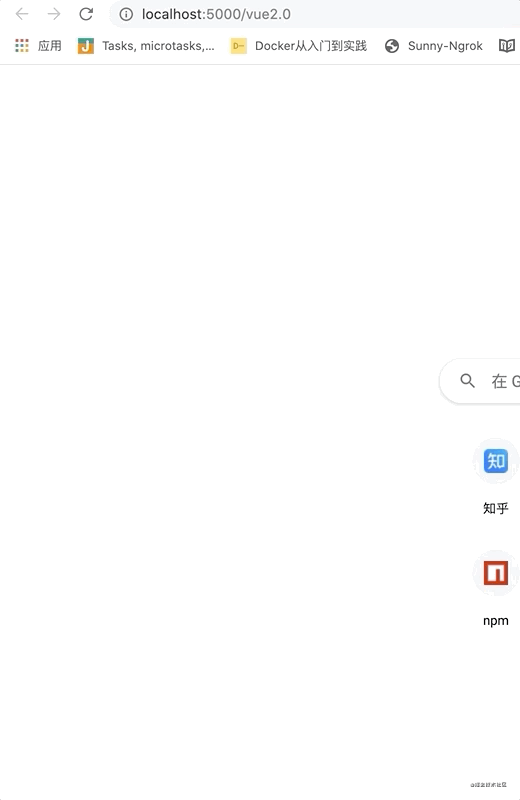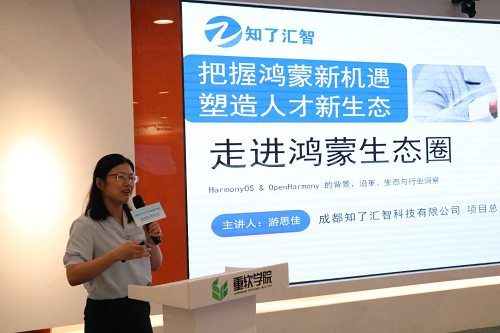当前位置:
知了堂&前端:手写Vue2系列之computed
知了堂2021-07-12770
目标
本篇的目标是实现 computed 计算属性,完成模版中计算属性的展示。涉及的知识点:
- 计算属性的本质
- 计算属性的缓存原理
实现
接下来就开始实现 computed 计算属性,。
_init
/src/index.js
/**
* 初始化配置对象
* @param {*} options
*/
Vue.prototype._init = function (options) {
// ...
// 初始化 options.data
// 代理 data 对象上的各个属性到 Vue 实例
// 给 data 对象上的各个属性设置响应式能力
initData(this)
// 初始化 computed 选项,并将计算属性代理到 Vue 实例上
// 结合 watcher 实现缓存
initComputed(this)
// 安装运行时的渲染工具函数
renderHelper(this)
// ...
}
复制代码
initComputed
/src/initComputed.js
/**
* 初始化 computed 配置项
* 为每一项实例化一个 Watcher,并将其 computed 属性代理到 Vue 实例上
* 结合 watcher.dirty 和 watcher.evalute 实现 computed 缓存
* @param {*} vm Vue 实例
*/
export default function initComputed(vm) {
// 获取 computed 配置项
const computed = vm.$options.computed
// 记录 watcher
const watcher = vm._watcher = Object.create(null)
// 遍历 computed 对象
for (let key in computed) {
// 实例化 Watcher,回调函数默认懒执行
watcher[key] = new Watcher(computed[key], { lazy: true }, vm)
// 将 computed 的属性 key 代理到 Vue 实例上
defineComputed(vm, key)
}
}
复制代码
defineComputed
/src/initComputed.js
/**
* 将计算属性代理到 Vue 实例上
* @param {*} vm Vue 实例
* @param {*} key computed 的计算属性
*/
function defineComputed(vm, key) {
// 属性描述符
const descriptor = {
get: function () {
const watcher = vm._watcher[key]
if (watcher.dirty) { // 说明当前 computed 回调函数在本次渲染周期内没有被执行过
// 执行 evalute,通知 watcher 执行 computed 回调函数,得到回调函数返回值
watcher.evalute()
}
return watcher.value
},
set: function () {
console.log('no setter')
}
}
// 将计算属性代理到 Vue 实例上
Object.defineProperty(vm, key, descriptor)
}
复制代码
Watcher
/src/watcher.js
/**
* @param {*} cb 回调函数,负责更新 DOM 的回调函数
* @param {*} options watcher 的配置项
*/
export default function Watcher(cb, options = {}, vm = null) {
// 备份 cb 函数
this._cb = cb
// 回调函数执行后的值
this.value = null
// computed 计算属性实现缓存的原理,标记当前回调函数在本次渲染周期内是否已经被执行过
this.dirty = !!options.lazy
// Vue 实例
this.vm = vm
// 非懒执行时,直接执行 cb 函数,cb 函数中会发生 vm.xx 的属性读取,从而进行依赖收集
!options.lazy && this.get()
}
复制代码
watcher.get
/src/watcher.js
/**
* 负责执行 Watcher 的 cb 函数
* 执行时进行依赖收集
*/
Watcher.prototype.get = function () {
pushTarget(this)
this.value = this._cb.apply(this.vm)
popTarget()
}
复制代码
watcher.update
/src/watcher.js
/**
* 响应式数据更新时,dep 通知 watcher 执行 update 方法,
* 让 update 方法执行 this._cb 函数更新 DOM
*/
Watcher.prototype.update = function () {
// 通过 Promise,将 this._cb 的执行放到 this.dirty = true 的后面
// 否则,在点击按钮时,computed 属性的第一次计算会无法执行,
// 因为 this._cb 执行的时候,会更新组件,获取计算属性的值的时候 this.dirty 依然是
// 上一次的 false,导致无法得到最新的的计算属性的值
// 不过这个在有了异步更新队列之后就不需要了,当然,毕竟异步更新对象的本质也是 Promise
Promise.resolve().then(() => {
this._cb()
})
// 执行完 _cb 函数,DOM 更新完毕,进入下一个渲染周期,所以将 dirty 置为 false
// 当再次获取 计算属性 时就可以重新执行 evalute 方法获取最新的值了
this.dirty = true
}
复制代码
watcher.evalute
/src/watcher.js
Watcher.prototype.evalute = function () {
// 执行 get,触发计算函数 (cb) 的执行
this.get()
// 将 dirty 置为 false,实现一次刷新周期内 computed 实现缓存
this.dirty = false
}
复制代码
pushTarget
/src/dep.js
// 存储所有的 Dep.target
// 为什么会有多个 Dep.target?
// 组件会产生一个渲染 Watcher,在渲染的过程中如果处理到用户 Watcher,
// 比如 computed 计算属性,这时候会执行 evalute -> get
// 假如直接赋值 Dep.target,那 Dep.target 的上一个值 —— 渲染 Watcher 就会丢失
// 造成在 computed 计算属性之后渲染的响应式数据无法完成依赖收集
const targetStack = []
/**
* 备份本次传递进来的 Watcher,并将其赋值给 Dep.target
* @param {*} target Watcher 实例
*/
export function pushTarget(target) {
// 备份传递进来的 Watcher
targetStack.push(target)
Dep.target = target
}
复制代码
popTarget
/src/dep.js
/**
* 将 Dep.target 重置为上一个 Watcher 或者 null
*/
export function popTarget() {
targetStack.pop()
Dep.target = targetStack[targetStack.length - 1]
}
复制代码
结果
好了,到这里,Vue computed 属性实现就完成了,如果你能看到如下效果图,则说明一切正常。

可以看到,页面中的计算属性已经正常显示,而且也可以做到响应式更新,且具有缓存的能力(通过控制台查看 computed 输出)。
大家都在看
知了汇智项目总监探讨鸿蒙生态与人才培育新机遇
2024-05-06浏览次数:73知了汇智引领产教融合新篇章:成都纺织高专与西南石油大学学子共赴国际商贸城研学之旅
2024-04-30浏览次数:78知了汇智与西昌学院信息技术学院深入交流,探索校企合作新模式
2024-04-29浏览次数:93鸿蒙生态新机遇,知了汇智在重软学院研讨会发表前沿见解
2024-04-28浏览次数:94探秘人工智能AIGC,汇智知了堂19.9元课程助你掌握未来技能!
2024-04-25浏览次数:182以赛促学|知了汇智“知了杯”网络安全趣味赛在西科大圆满落幕
2024-04-24浏览次数:87网络安全新突破:知了汇智成为奇安信金牌代理商,引领行业新潮流
2024-04-23浏览次数:103汇智知了堂网络安全75班晨会揭秘:NAS应用助力网络安全新飞跃
2024-04-18浏览次数:108














